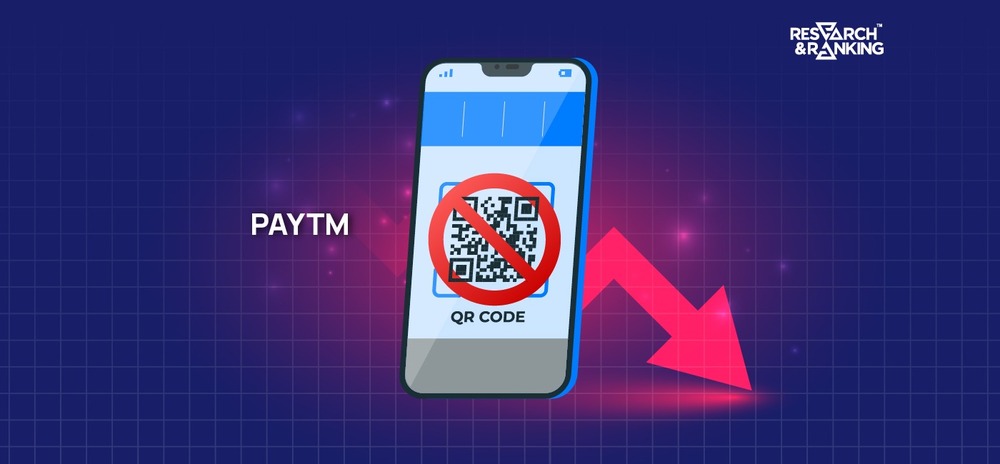As we all tuned into the Union Budget drama yesterday, Paytm, India’s digital wallet champ, faced a rough patch. Due to some’ non-compliance’ issues, the Reserve Bank of India (RBI) put limits on their banking arm, Paytm Payments Bank Limited (PPBL).
This sudden halt affected its market performance to a considerably low 609 yesterday from a stable 761 the previous day. It has left many users confused and wondering what it meant for their Paytm journeys. Let’s see what it means for Paytm users and the future of Indian fintech.
RBI Tightens the Noose
The trouble began in March 2022 when the RBI barred PPBL from onboarding new customers. But as it continued to add customers, in January 2024, the central bank retook charge, and events escalated. Due to constant non-compliance and supervisory concerns, the RBI imposed a series of restrictions:
- No more new customers: After February 29th, 2024, signing up for Paytm Payments Bank will be a thing of the past.
- Deposits and top-ups on hold: Adding funds to your PPBL account will no longer be an option after the deadline.
- Prepaid transactions restricted: Say goodbye to using FASTags, NCMC cards, and other prepaid instruments through PPBL after February 29th.
- Banking services halted: PPBL has ditched traditional banking features like fund transfers and bill payments.
What’s Next For Paytm?
Paytm isn’t taking this lying down. Founder Vijay Shekhar Sharma is exploring partnerships with other banks to transfer PPBL’s business. Your existing Paytm wallet and savings account might be migrated to a new partner bank, and your Virtual Payment Address (VPA) will likely change.
Uncertainty Persists
The future of PPBL’s existing customer base remains unclear. While Paytm assures that deposits and balances are safe, one must wait and watch the exact impact of the transition to a new partner bank. Also, the fate of UPI payments offered through PPBL remains uncertain, potentially impacting millions of users who rely on it.
What Does This Mean For You?
If you’re an existing Paytm user, here’s what you need to know:
- Your money is safe: Your existing deposits in savings accounts, wallets, FASTags, and NCMC cards are unaffected. You can still access and use them as usual.
- Limited transactions: After February 29th, you can only withdraw or transfer existing funds. No more adding money or making new transactions through PPBL.
- Banking alternatives: Explore other options for banking services like fund transfers and UPI payments.
- Stay informed: Keep an eye out for updates from Paytm and your new partner bank (if applicable) regarding the transition process.
The Big Picture
The RBI’s action raises concerns about regulatory compliance in India’s booming fintech sector. It also highlights the importance of transparency and responsible practices for companies like Paytm. While the immediate impact might be inconvenient for users, it could lead to a more robust and secure financial ecosystem in India.
Looking Ahead
The Paytm story is far from over. The company’s future depends on its ability to navigate this regulatory hurdle and effectively transition its banking business. As for users, adapting to the changes and exploring alternative options might be necessary. The Indian fintech landscape is constantly evolving, and Paytm’s next chapter will be interesting to watch.
Know more about
IPO | Current IPO | Upcoming IPO | Listed IPO
Beyond the Headlines
This saga goes beyond just a regulatory setback. It highlights the importance of compliance and transparency in the fintech space. It also raises questions about the evolving regulatory landscape and its impact on digital payment innovation.
As the story unfolds, it’s essential to stay informed and understand the broader implications, not just for Paytm but for the future of digital payments in India.
Read More: Grey Market Premium
*Disclaimer Note: The securities quoted, if any, are for illustration only and are not recommendatory. This article is for education purposes only and shall not be considered as recommendation or investment advice by Research & Ranking. We will not be liable for any losses that may occur. Investment in securities market are subject to market risks. Read all the related documents carefully before investing. Registration granted by SEBI, membership of BASL, and certification from NISM in no way guarantee the performance of the intermediary or provide any assurance of returns to investors.
How useful was this post?
Click on a star to rate it!
Average rating 5 / 5. Vote count: 2
No votes so far! Be the first to rate this post.
I’m Archana R. Chettiar, an experienced content creator with
an affinity for writing on personal finance and other financial content. I
love to write on equity investing, retirement, managing money, and more.
-
Archana Chettiarhttps://www.equentis.com/blog/author/archana/
-
Archana Chettiarhttps://www.equentis.com/blog/author/archana/
-
Archana Chettiarhttps://www.equentis.com/blog/author/archana/
-
Archana Chettiarhttps://www.equentis.com/blog/author/archana/

